Written by Bryan Dearsley
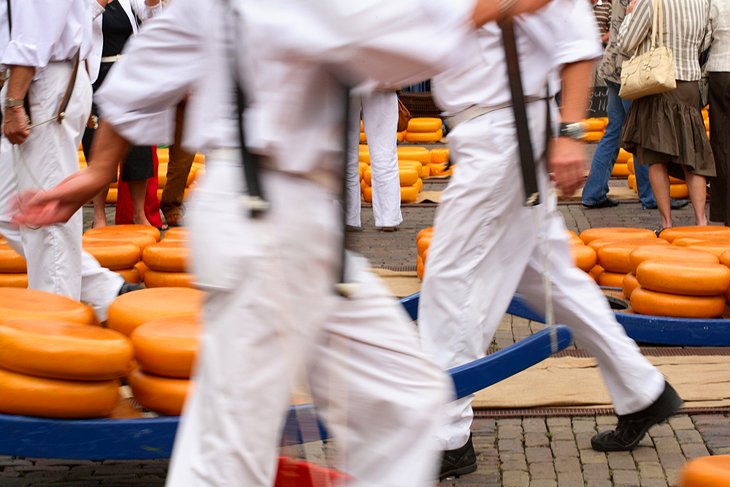
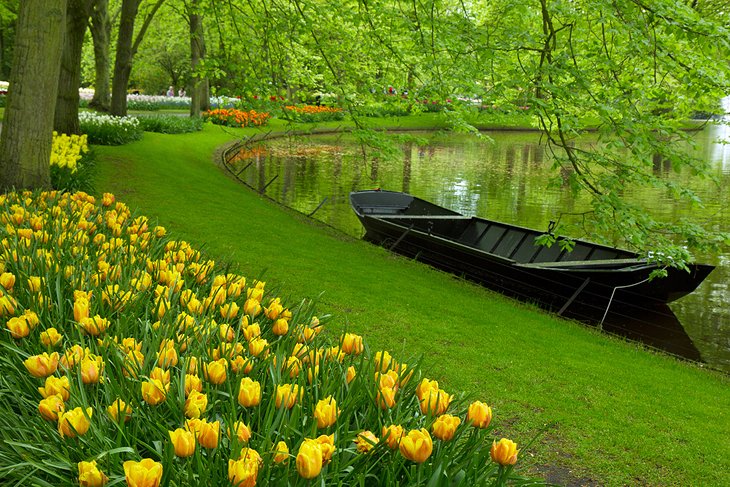
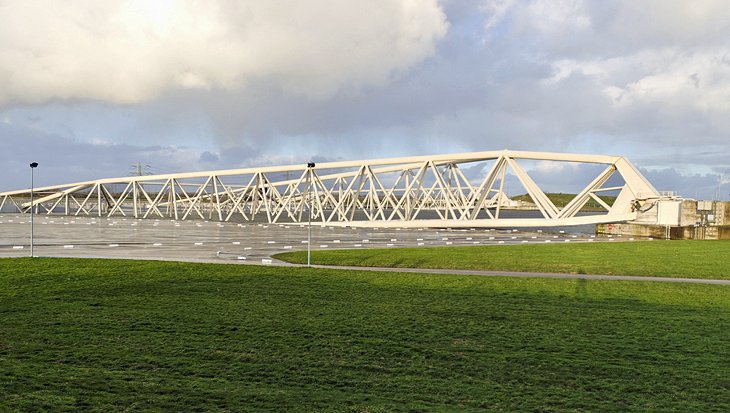
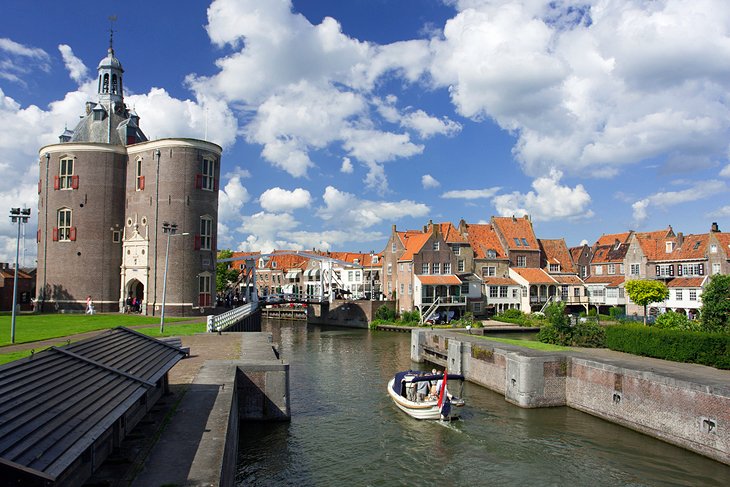
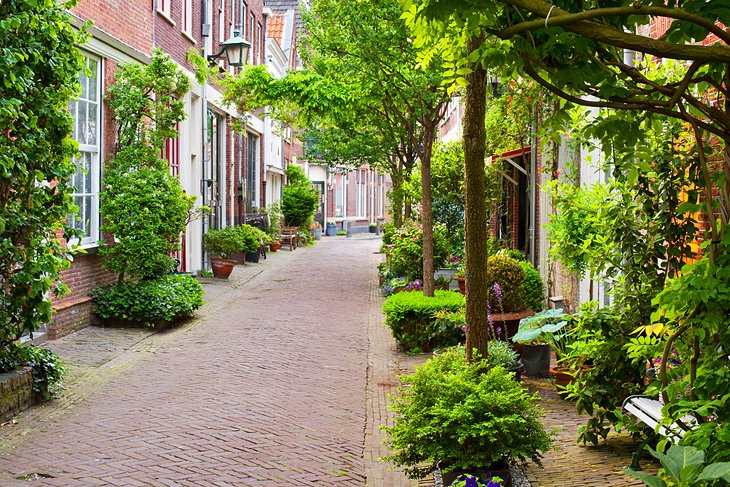
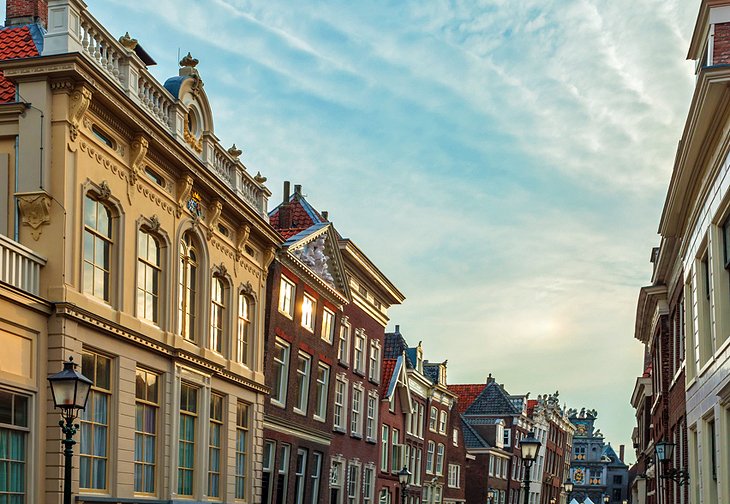
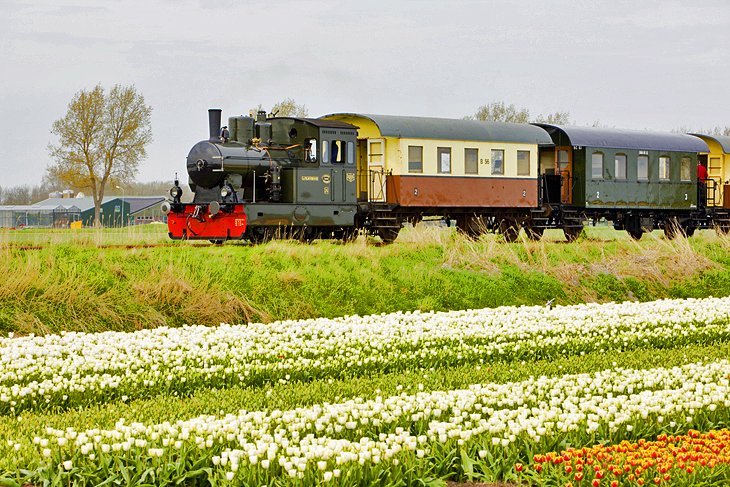
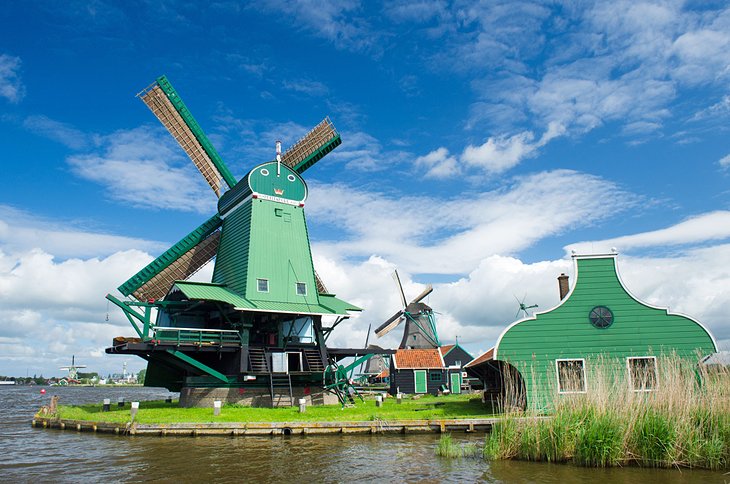
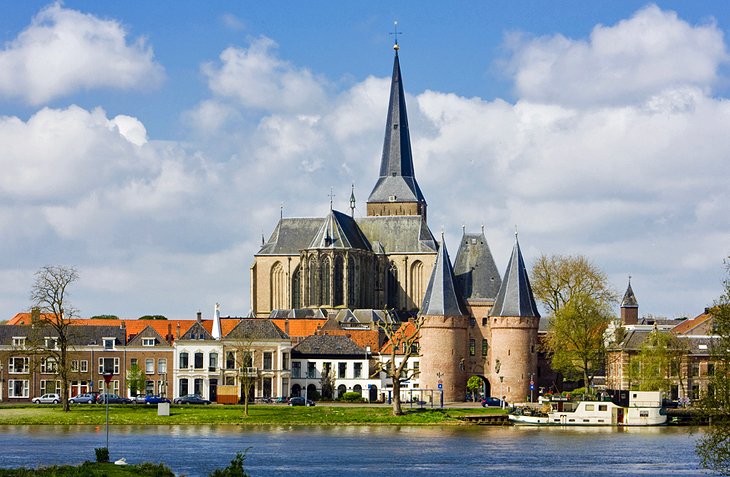 The old Hanseatic town of Kampen lies on the picturesque left bank of
the IJssel, four kilometers above its outflow into the Ijsselmeer.
Although Kampen is an hour's drive from Amsterdam, it's well worth the
effort if you're looking to see one of the prettiest towns in the
Netherlands. Dating back to the 12th century, this historic town was
once the country's most important trading center with the Baltic area,
as well as France and England,
and thanks to its wealth and prestige, Kampen has managed to preserve
many of its most important old structures. Examples include the
15th-century Town Gates, three of which survive: the rectangular
Koornmarktspoort, on the banks of the IJssel; the Broederpoort with its
four corner towers; and the Cellebroederpoort, a rectangular structure
with two round towers. Immediately west of Kampen Town Hall is the Tower of the Holy Ghost, also known as the New Tower as it was built 1664.
The old Hanseatic town of Kampen lies on the picturesque left bank of
the IJssel, four kilometers above its outflow into the Ijsselmeer.
Although Kampen is an hour's drive from Amsterdam, it's well worth the
effort if you're looking to see one of the prettiest towns in the
Netherlands. Dating back to the 12th century, this historic town was
once the country's most important trading center with the Baltic area,
as well as France and England,
and thanks to its wealth and prestige, Kampen has managed to preserve
many of its most important old structures. Examples include the
15th-century Town Gates, three of which survive: the rectangular
Koornmarktspoort, on the banks of the IJssel; the Broederpoort with its
four corner towers; and the Cellebroederpoort, a rectangular structure
with two round towers. Immediately west of Kampen Town Hall is the Tower of the Holy Ghost, also known as the New Tower as it was built 1664.
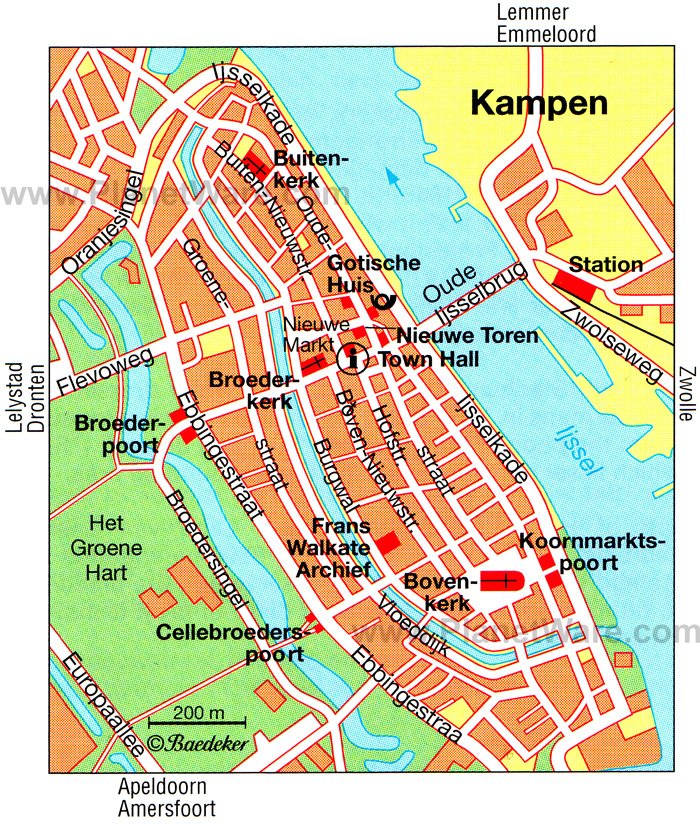
Kampen Map - Attractions
After you've had your fill of the bright lights and bustle of the big
city, be sure to spend a little time exploring the area around
Amsterdam. An easy drive or commute via public transport will reward you
with a chance to see some wonderful old towns and villages, along with
numerous fun attractions. From the spectacular coastline, just a few
kilometers away, to the country's most important tulip growing region,
to quaint little markets and shops, there are many fantastic excuses to
hop on a train or bus and explore the area around Amsterdam. To help get you started, be sure to read through this handy list of the top 10 attractions outside Amsterdam.
1 The Cheese Market, Alkmaar

The Cheese Market, Alkmaar
About 42 kilometers north of Amsterdam on the North Holland Canal -
and just eight kilometers from the North Sea - the charming town of
Alkmaar boasts many fine architectural monuments and old guild-houses
from the 16th to 18th centuries. But the highlight of an excursion to
this picturesque town in the province of North Holland is its world
famous Cheese Market, one of the best-known tourist attractions in the
Netherlands. Held every Friday in front of the town's Weigh-House in
strict accordance with centuries-old traditions (the first such market
was held here in the 1590s), it's a fascinating sight to watch as the
square is covered with more than 23 tons of large, round Edam and Gouda
cheeses. Adding to the experience is watching the cheese-porters,
dressed in white and wearing hats in the colors of their guild, carry
sometimes as many as 80 Edam cheeses on cradle-like racks to be weighed.
Before anything can be shipped off, the crowds are welcomed and bells
are rung (English language explanations of the rituals are offered at
11:20am). Afterwards, pop into the Alkmaar Cheese Museum in the Weigh House for its exhibits on the history of cheesemaking.
Address: Waagplein, Alkmaar
2 Editor's Pick Keukenhof: The Garden of Europe

Keukenhof: The Garden of Europe
Along with its famous cheeses, the Netherlands is also known the
world over for its flowers, in particular its tulips. Just 38 kilometers
southwest of Amsterdam on the outskirts of the town of Lisse is
spectacular Keukenhof, also known as the Garden of Europe, and the best
place to view the country's rich floral bounty. The area is known as the
Netherlands' "bulb belt," and Keukenhof itself covers an area of more
than 70 acres. This picture-perfect landscape once formed the kitchen
garden (or "keuken") of a large country estate, much of it now
consisting of restaurants, patios, and exhibitions, along with more than
700 varieties of tulips, hyacinths, crocuses, and daffodils. It's also
home to numerous fun flower-related events and festivals, from flower
shows to markets and concerts.
Address: Stationsweg 166A, 2161 AM Lisse
Official site: www.keukenhof.nl
4 The Delta Works and the Maeslant Barrier

Maeslant Barrier
About 70 kilometers southwest of Amsterdam just past The Hague on the Hook of Holland, the Maeslant Barrier
is just part of the country's massive Delta Works project, an
engineering marvel designed to prevent flooding. The final piece of this
engineering puzzle, the barrier consists of two huge gates capable of
closing off the New Waterway when a storm surge threatens. The visitor
center in the historic Keringhuis provides a fascinating glimpse into
the history and construction of the Delta Works project, as well as a
chance to view shipping traffic as it sails in and out of Rotterdam.
Plan your visit around a test closing of the barrier (details from
their website). English language guided tours of the storm surge barrier
and museum are available on weekends (reservations required).
Address: Maeslantkeringweg 139, 3151 ZZ Hoek van Holland
5 The Old Town of Enkhuizen

The Old Town of Enkhuizen
On the IJsselmeer (a shallow artificial lake) and
traversed by numerous canals, Enkhuizen is one of the prettiest towns in
the Netherlands. About 64 kilometers north of Amsterdam (and easily
accessible by public transit), Enkhuizen boasts numerous historical
attractions, from its two 15th-century churches to its 17th-century town
walls and gates. Other must-sees include its picturesque harbor, home to innumerable boats and yachts, as well as a chance to take the ferry to the Zuiderzee Museum. The Dromedaris Tower,
another relic of the town's fortifications built in 1540, is also worth
a visit; in addition to its superb views, it boasts a carillon that
ranks among the finest in the Netherlands
(be sure to check out the old prison cells). Also on the IJsselmeer,
about 40 minutes south of Enkhuizen, the old fishing village of Volendam is worth a visit to see its traditional fishing boats and Dutch costumes featuring the iconic women's pointed bonnet. 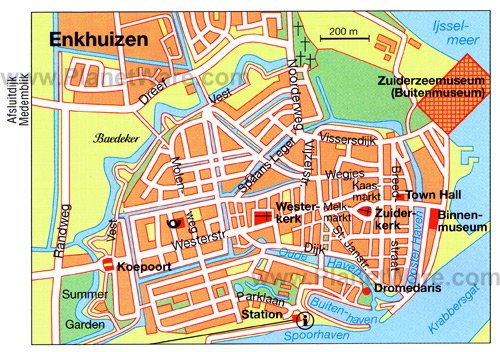

Enkhuizen Map - Attractions
6 Historic Haarlem

Historic Haarlem
Approximately 19 kilometers due west of Amsterdam, historic Haarlem
is just seven kilometers from the North Sea coast on the little River
Spaarne. Established in 1245, Haarlem was a hotbed of artistic endeavor
during the 17th century when it became home to many of the country's
most famous painters, some of whose works can be seen in the superb Frans Hals Museum. A highlight of the city's old main square is the 14th-century Grote Kerk (St.
Bavokerk); a huge Late Gothic structure notable for its slender
40-meter-tall tower; its many rich furnishings (of particular interest
are the three old model warships, a nod to the church's role as the
chapel of the Seamen's Guild); and the famous 18th-century Müller Organ, one of the greatest such instruments in the world for its tone and decoration. Finally, be sure to take a peek into the Old City Hall, built in the 13th century and notable for its large tower and plush interior (guided tours are available).
7 Hoorn

Hoorn
Another of the many quaint towns on the Ijsselmeer, Hoorn is becoming
an increasingly popular tourist destination, thanks to its many fine
historic buildings and picturesque waterside setting. Highlights include
the town's two yacht harbors lined with attractive 17th-century gabled
houses, galleries, shops, and museums, and the historic old Town Hall
(Stadhuis), built in 1402 and originally home to the convent of St.
Cecilia. Interior highlights include the 18th-century Council Chamber
with its painting of the naval battle of 1573. Also of note are the Grote Kerk from 1883 and the former St. Jans Gasthuis, dating from 1563 and known for its early Renaissance façade. Another must-see is the West Frisian Museum
(Westfries Museum) with its collections of material from the 16th to
the 18th centuries relating to the history of the town and surrounding
area, including numerous group portraits of the once famous marksmen's
guilds. 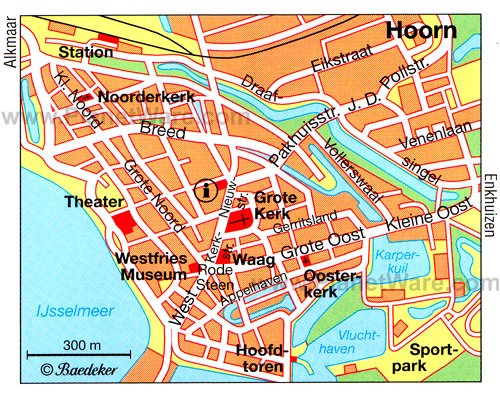

Hoorn Map - Attractions
8 Medemblik by Steam Train

Medemblik by Steam Train
The best way to reach Medemblik is via Stoomtram Hoorn Medemblik, a
20-kilometer heritage railway line that runs from the equally
picturesque town of Hoorn. Once there, you'll have plenty of time
to explore the town before heading back to Hoorn (the route can also be
done in the other direction). Founded in the 10th century, Medemblik
lies on the IJsselmeer and is home to Kasteel Radboud, an old fortress that's been fully restored and makes for a splendid photo. Other highlights include St. Bonifaciuskerk,
a Late Gothic hall-church from the 15th century containing the tomb of
Lord George Murray, a Jacobite commander at the battle of Culloden in Scotland in 1745; the 17th-century Weigh House (Waag), used to weigh cheese; and the Dutch Steam Engine Museum
in the old pumping station, home to a collection of steam engines used
on ships and in industry, most of them still in working order.
9 Zaanse Schans Open-Air Museum

Zaanse Schans Open-Air Museum
The Zaanse Schans open-air museum is so picture-perfect, it's hard to
believe it's actually a real community. Based on the original village
of Zaanland as it would have looked around 1700, the museum was
established to preserve buildings threatened by industrial development.
Typical old wooden houses and windmills of the 17th and 18th centuries
were taken down and carefully restored on the site, providing a vivid
impression of life in earlier centuries - an effect enhanced by the fact
that most of the houses are occupied. Other features of note are its
large collection of still functioning windmills, including an oil mill, a
paint mill, a mustard mill, and a sawmill, as well as a cheese-making
dairy, an old bakery, a grocer's shop, a clog-maker's workshop, and a
clock museum. Guided tours are available, as is a very pleasant boat
trip on the Zaan offering great views of the old houses and windmills
from the water.
Address: Westkade 2, 1506 BA Zaandam
Official site: www.dezaanseschans.nl/en/
10 Kampen's Many Towers

Kampen's Many Towers

Kampen Map - Attractions
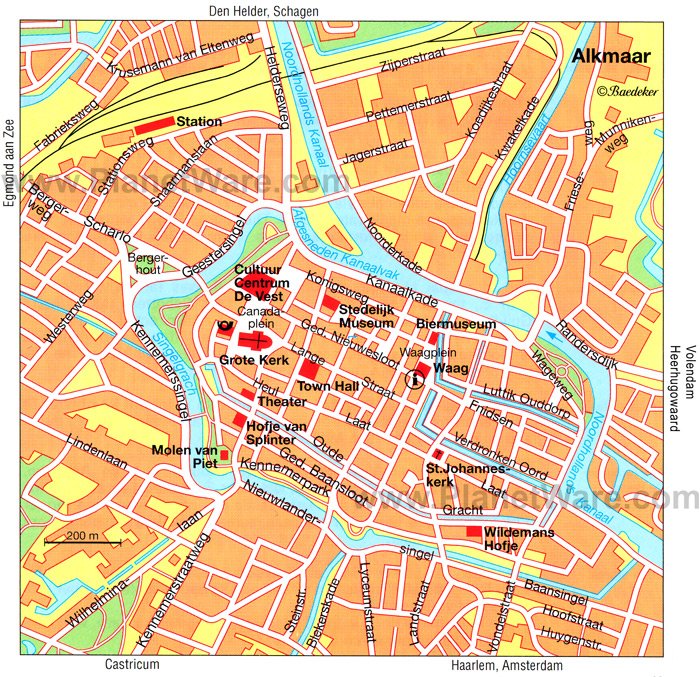
No comments:
Post a Comment